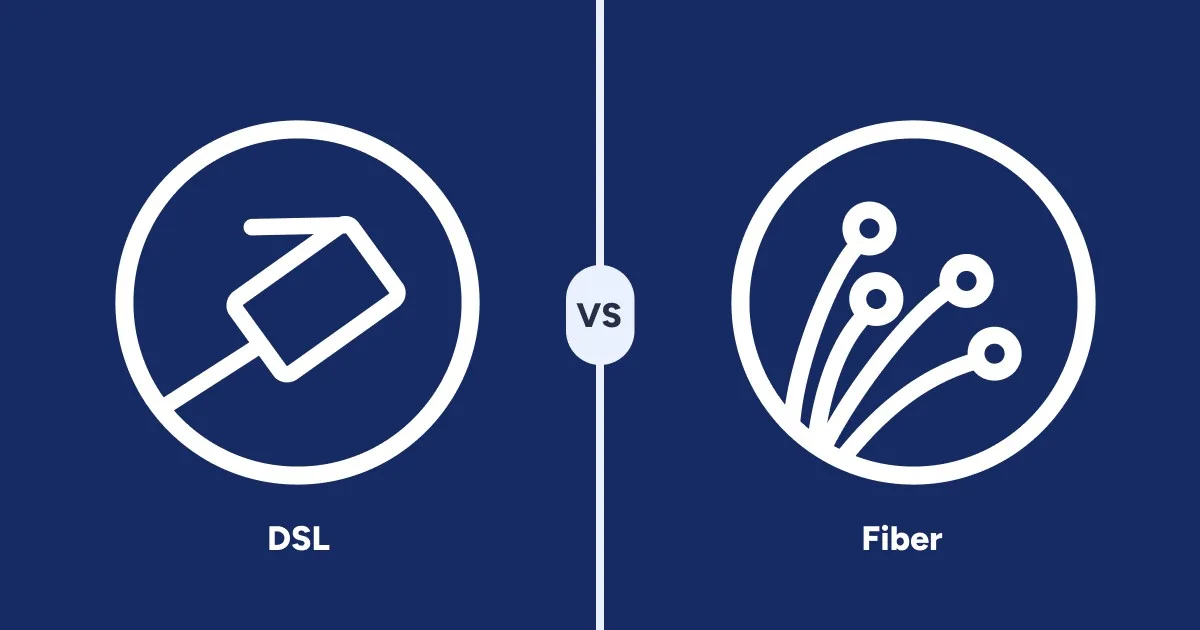7 Ways To Lower Your Internet Bill
Ready to get frugal and save on overpriced internet?
Aug 12, 2025 | Share
FAQ
The cost of living is ever-increasing, and internet bills are no exception. If you’re on the hunt to save some money, home internet is a good place to start since it’s one of the only flexible home utilities. We’ll help you navigate the best ways to save money on your internet bill.
Always start by looking at your internet bill and understanding what you are being billed for each month. You might be paying for equipment or special Wi-Fi fees you didn’t know about. Once you know exactly what you are paying for, you can begin looking at ways to save. A minor adjustment to your service, like enrolling in autopay or paperless billing, can help you start your journey to lower your internet bill.
1. Shop for a new provider
We recommend scoping out the competition and getting familiar with what is offered in your area. This is a great place to start, especially if you aren’t happy with your current provider. If you are happy with your provider, but find a better deal elsewhere, you can use that as leverage to bargain for a lower price from your current provider.
Ready to check out what’s available in your area?
Enter your zip code to see what providers and plans are in your area.
2. Switch to a different internet plan
There’s a chance you might be overpaying for zippy internet speeds you simply don’t need. If you’ve got 60 seconds to spare, take our handy How Much Speed Do I Need? test and answer six quick questions to get a personalized internet speed recommendation.
Once you’re familiar with your speed needs, you can reach out to your provider and change to a different plan or go back to shopping around for another provider if yours doesn’t meet your household needs.
3. Buy your own equipment
Most providers will rent equipment for what initially seems like a relatively low monthly price, but in just a year, that rental fee can easily add up to what you would pay to buy your own equipment. Purchasing your own equipment is a worthwhile investment that also gives you control over your home network speeds and performance.
Buying your own equipment lets you personalize your home network to your needs. You can get a gaming router or a router for security if you want to further protect your home network. Check out our recommendations and start saving on rental fees!
4. Check out deals and promotions
Regularly checking current deals from internet providers is a great way to lock in some savings. We do the heavy lifting for you and compile a handy list of the best monthly deals—may the deals be ever in your favor!
You can score gift cards, freebies, streaming subscriptions, or a price lock to guarantee your internet price won’t skyrocket anytime soon. Some offers might only be available for new customers, but you can always reach out to your internet provider to see if they have any special promotions or offers for current customers.
5. See if you qualify for additional discounts
Some providers offer discounts for veterans or military families, senior citizens, and students. Even if your provider doesn’t advertise a discount for any of these groups, it doesn’t hurt to reach out and ask your provider about any special discounts they might be able to give you.
Check out our lineup of the best internet plans and discounts for seniors, students, and military families to see if your provider or a provider in your area has a special offer you qualify for.
Some providers offer low-income plans for qualifying households. If you think you may qualify for a low-income plan, check out our list of programs available to make internet service more affordable.
6. Bundle your internet service
Most providers will offer cable TV or wireless services that you can bundle for a potential discount. Even if your provider doesn’t offer a direct discount for bundling services, the price might end up being cheaper than what you currently pay, so it’s worth at least looking into—plus, you’ll enjoy the convenience of paying multiple services in one bill.
Take a look at mobile and TV bundles currently being offered and our guide on how to pick a solid mobile bundle.
7. Contact your internet provider
Most internet service providers will offer deals or even reduce your monthly fees if they so much as catch wind of you looking to switch to another internet provider. You can use the deals and promotions that other providers are offering in your favor and leverage them to get something similar.
Your internet provider might have some suggestions to lower your monthly costs that you might have missed on your monthly bill. Here are some helpful prompts you can use to initiate a bargain with your internet provider.
- I noticed another internet provider in the area offers similar speeds for a lower price. Can you do anything to match that offer?
- I really need to lower my internet bill. Are there any adjustments we can make to my service to make that happen?
- Please connect me with someone in customer retention because I’m ready to change providers if I don’t get a better deal.
If you’ve ever worked in customer service, you know how tough dealing with angry customers can be. It’s important to strike the perfect balance of being nice, respectful, and assertive when trying to bargain with customer service. Be prepared with your account information, the internet speeds you need, and any other info you think you may need.
Saving money on your internet bill FAQ
How can you save money on your internet bill?
Why did my Wi-Fi bill go up?
How can I save money on internet and TV service?
Author - Andrea GutierrezPrieto
After graduating from the University of Utah with an honors degree in Linguistics, Andrea Gutierrez Prieto transitioned from being an Analytic Linguist and Research Assistant to the HighSpeedInternet.com team. Andrea has a background in academic and research writing with a passion for helping readers make informed decisions. Off the clock, Andrea spends her time watching anime, reading manga, and baking delicious pastries at home.
Editor - Jessica Brooksby
Jessica loves bringing her passion for the written word and her love of tech into one space at HighSpeedInternet.com. She works with the team’s writers to revise strong, user-focused content so every reader can find the tech that works for them. Jessica has a bachelor’s degree in English from Utah Valley University and seven years of creative and editorial experience. Outside of work, she spends her time gaming, reading, painting, and buying an excessive amount of Legend of Zelda merchandise.




